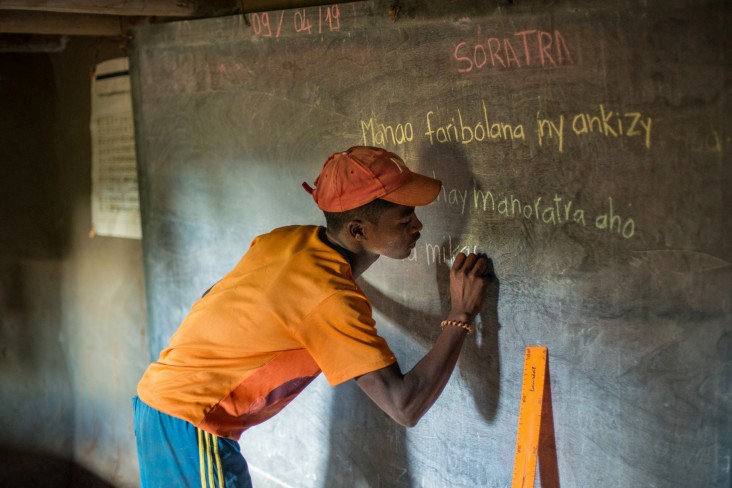Speeches Shim

It is dark and cool inside the room. Students are seated on the floor, their backs pressed against an old wooden bed frame, the bare cement wall, or large sacks of grain.
At the teacher’s command, a man rises from the floor and approaches the chalkboard. He is instructed to complete the two math problems displayed: 6,202 divided by 7; 2,313 multiplied by 3. He navigates the long division with ease; the multiplication even quicker. He takes his seat against a bag of grain as his classmates clap in unison.
His backrest is fitting. After all, it is the grain itself that has brought these men and women here to learn. As they well know, the market is unforgiving for a farmer who is illiterate.
“Literacy training is a program for adults who don’t know how to read, write, or do math,” said Vero Hanitritiniaina Antoinette, known as Vero. She is a literacy teacher and site animator for the United States Agency for International Development’s (USAID) ASOTRY food security program. Vero’s responsibilities include the education of her own students and the students of three other literacy program sites in this region.
The agricultural trade consists of crop varieties, quantities, dates, administrative processes, and sales both piecemeal and bulk. The inability to read, write, or count is an obvious limitation. Illiterate farmers are tricked into bad deals, miss out on good deals, and in general remain stagnant in a fast moving industry.
And in Anaody village, in Anjoma Commune, it is a common disadvantage.
“We have many illiterate people in the community,” Vero said. “We held events to distribute food and people have to sign to receive their portion. We noticed many couldn’t sign their names.”
The ASOTRY literacy program offered to change that for anyone willing to learn.
“I wanted to join the literacy training because I didn’t know how to read or write at all,” said Marie Louise Ravampionona, a 46-year-old mother of six and recent graduate of the seven-month program. “It was my husband who managed everything in my life. When I joined a Village Savings and Loans group I couldn’t even write my name, so I had to ask others to do that. I didn’t like it.”
Those sentiments are the same ones that compelled farmers of all ages, both male and female, to enroll in the program. After years of fear and shame, the adults of this community have chosen a change.
“Before, if they had to go do administrative activities, they were scared,” Vero said. “Now they can fill out forms and write papers and understand easily. The administrative processes are no longer difficult for them. In meetings, they can stand and express their point of view, and in their daily lives they can rely on themselves to go to the market and pursue their daily activities. The fear is gone.”
After the math problems are completed, Vero calls on a young mother to go to the chalkboard and write a sentence: Mahay manoratra aho. The woman does so and reclaims her seat to the sound of clapping.
Though the clapping ritually follows each correct answer, it seems especially fitting now. The sentence this young farmer just wrote is the perfect marriage of action and meaning; in English, it translates to – ‘I can write’.
“I hope the students become models for the community, that their lives improve and that, in turn, they teach the other members of the community,” Vero said.
“We thank ASOTRY for this program,” she added. “It is a way for the community to reach development.”
ASOTRY, a project funded by USAID and operated by ADRA Madagascar, has provided literacy classes to 7,013 people like Marie Louise, giving them the power to improve their lives.

Comment
Make a general inquiry or suggest an improvement.